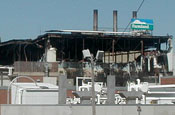Albert Lea braces for more bad news
By Laurel Druley
Minnesota Public Radio
July 24, 2001
As Albert Lea recovers from a devastating fire that damaged a large portion of the Farmland Foods plant, the town braces for another hit to its economy. Another major employer may be preparing to lay off a few workers. It's an unsettling time for the town's manufacturing employees.
AS THE SMOKE CLEARED OVER THE FARMLAND FOODS PLANT,
some people in Albert Lea might have thought Streater, Inc., the town's second-largest employer, could be hiring. But it appears that Streater, which manufactures industrial shelving units, won't be hiring any of Farmland's displaced employees. As a matter of fact, Thomas Stensrude, the vice president and general manager, says they may lay off workers soon.
"We adjust our head count based on what the order is, based on what the production is, on a monthly basis. We do not adjust our head count in major swings - usually just a few people," says Stensrude.
That news was in the air recently as hundreds of displaced Farmland employees attended a job fair at the Albert Lea National Guard Armory. At the entrance to the armory, Louise Peterson caught up with her friend Jennifer Johnson.
Peterson, who packaged bacon, says she has a family and a mortgage. She's collecting unemployment, about half her Farmland wages. She'll receive health care until the end of August. Johnson says she's lucky her husband didn't work for Farmland - many couples are looking at two lost incomes. Peterson and Johnson say many co-workers are waiting to see if plant officials decide to rebuild. The president of Farmland's pork division told employees they needed four to six weeks to make that decision.
"I think a lot of us are here just to see each other. We all miss each other but we're not going to lose hope. We want them to rebuild we'll be back. They don't have to worry about whether they'll have workers. Rebuild. Put the word out. We'll be back!" say Peterson and Johnson.
If they do rebuild, Farmland officials say they'd need a year to 18 months to be back in full operation. But many employees aren't waiting for the news. Several are skeptical, having seen trucks outside the plant hauling away equipment.
About 25 employers came to the job fair from as far away as Nebraska and as close as Austin. Manufacturing, temporary agencies and the military offered jobs to skilled and unskilled employees. Interpreter Geneveve Morales says 65 percent of Farmland's workers are Hispanic and the majority of them speak Spanish only.
"If you are not bilingual, it's going to be hard to get a job with the economy the way it is now," she says.
Morales says many Hispanic Farmland employees have already moved or are planning to move. She says they must go where the jobs are. Many have families living in Mexico to support and have to send paychecks home.
She reminds packaging worker Olga Cabriles to fill out a change-of-address card so Cabriles can have her unemployment trasferred. Carbriles is applying to work for the Farmland facility in Omaha, Neb.
"We want to go because there is no work here," says Cabriles. "Some have found jobs where they could. Some are going back to where they're from, like Mexico, or other places where they have families. Others live here and they're waiting to see if they get jobs nearby," she says.
When Cabriles and other Hispanics pack up, they will leave a footprint on Albert Lea's economy. Some local business owners who cater to the Hispanic population say they have already felt an impact.
Phillis Talamantes and her husband opened their market, Tienda Mexico, 10 years ago when an influx of Hispanics found jobs in the area. They carry food and products made in Mexico. Talamantes says she has consoled many customers who are Farmland employees.
"A lot have bought their own houses here and they like Albert Lea. They're established here and they don't want to move," says Talamantes. "The younger people who are single - they like Albert Lea too - but a lot of them are here to help their families. So they have to look for other jobs. They are very hard-working people. I feel sorry for them, but I try to give them courage to keep on going," she says.
Many young and single Hispanic workers say they're becoming accustomed to the transient lifestyle. Interpreter Geneveve Morales says she's doubtful there are enough manufacturing jobs for Spanish-speakers to go around in southeastern Minnesota. Unless, of course, Farmland rebuilds.
More coverage
Workers struggle in fire's aftermath
By Laurel Druley
Minnesota Public Radio
July 24, 2001
|
|
RealAudio |
As Albert Lea recovers from a devastating fire that damaged a large portion of the Farmland Foods plant, the town braces for another hit to its economy. Another major employer may be preparing to lay off a few workers. It's an unsettling time for the town's manufacturing employees.
| |
|
|
|
||
"We adjust our head count based on what the order is, based on what the production is, on a monthly basis. We do not adjust our head count in major swings - usually just a few people," says Stensrude.
That news was in the air recently as hundreds of displaced Farmland employees attended a job fair at the Albert Lea National Guard Armory. At the entrance to the armory, Louise Peterson caught up with her friend Jennifer Johnson.
Peterson, who packaged bacon, says she has a family and a mortgage. She's collecting unemployment, about half her Farmland wages. She'll receive health care until the end of August. Johnson says she's lucky her husband didn't work for Farmland - many couples are looking at two lost incomes. Peterson and Johnson say many co-workers are waiting to see if plant officials decide to rebuild. The president of Farmland's pork division told employees they needed four to six weeks to make that decision.
"I think a lot of us are here just to see each other. We all miss each other but we're not going to lose hope. We want them to rebuild we'll be back. They don't have to worry about whether they'll have workers. Rebuild. Put the word out. We'll be back!" say Peterson and Johnson.
If they do rebuild, Farmland officials say they'd need a year to 18 months to be back in full operation. But many employees aren't waiting for the news. Several are skeptical, having seen trucks outside the plant hauling away equipment.
About 25 employers came to the job fair from as far away as Nebraska and as close as Austin. Manufacturing, temporary agencies and the military offered jobs to skilled and unskilled employees. Interpreter Geneveve Morales says 65 percent of Farmland's workers are Hispanic and the majority of them speak Spanish only.
| |
|
|
|
||
Morales says many Hispanic Farmland employees have already moved or are planning to move. She says they must go where the jobs are. Many have families living in Mexico to support and have to send paychecks home.
She reminds packaging worker Olga Cabriles to fill out a change-of-address card so Cabriles can have her unemployment trasferred. Carbriles is applying to work for the Farmland facility in Omaha, Neb.
"We want to go because there is no work here," says Cabriles. "Some have found jobs where they could. Some are going back to where they're from, like Mexico, or other places where they have families. Others live here and they're waiting to see if they get jobs nearby," she says.
When Cabriles and other Hispanics pack up, they will leave a footprint on Albert Lea's economy. Some local business owners who cater to the Hispanic population say they have already felt an impact.
Phillis Talamantes and her husband opened their market, Tienda Mexico, 10 years ago when an influx of Hispanics found jobs in the area. They carry food and products made in Mexico. Talamantes says she has consoled many customers who are Farmland employees.
"A lot have bought their own houses here and they like Albert Lea. They're established here and they don't want to move," says Talamantes. "The younger people who are single - they like Albert Lea too - but a lot of them are here to help their families. So they have to look for other jobs. They are very hard-working people. I feel sorry for them, but I try to give them courage to keep on going," she says.
Many young and single Hispanic workers say they're becoming accustomed to the transient lifestyle. Interpreter Geneveve Morales says she's doubtful there are enough manufacturing jobs for Spanish-speakers to go around in southeastern Minnesota. Unless, of course, Farmland rebuilds.
More coverage
Workers struggle in fire's aftermath


